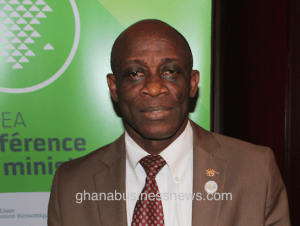Ghana’s economy will see a turnaround next year – Terkper

The Minister of Finance, Seth Terkper says next year Ghana’s economy will see a turnaround with more diversified growth led by oil and gas.
Mr Terkper was cited to have said these in an interview with the Bloomberg news service.
“Next year we are seeing the turnaround. We’ll see a more diversified growth. Oil and gas will be the key one to give it a boost,” he told Bloomberg.
He also said the country is working in the long term to regain its credit retains after downgrades by agencies S&P and Moody’s.
The Center for Policy Analysis (CEPA) says Ghana’s performance as measured by the key macroeconomic indicators is worse than the pre-oil era.
The think tank says the country’s growth performance has been on a downward trend despite two periods of growth spurts leading to the need for an ‘IMF bailout’.
The International Monetary Fund (IMF), on April 3, 2015, approved a $918 million three-year Extended Credit Facility (ECF) for Ghana, but classified the country as “high risk of debt distress” under new debt sustainability analyses (DSA).
Prof Joe Abbey, an economist and Executive Director of CEPA has said the IMF programme would not necessarily address the downward trend of the economy, but “it is just meant to buy credibility,” he added.
But Mr Terkper had expressed confidence that the progressive policies and measures adopted by the government would lead the economy back to a record growth within the shortest possible time.
According to him, Ghana’s economy had bright medium term prospects, supported by an expanded services sector, and the discovery of more oil fields (TEN and Sankofa), and the coming on stream of the gas processing plant, were clear indications that the progress would happen sooner even though similar projections in the past had not really materialised.
However, falling oil prices have affected projected government revenue.
Mr Terkper had said his ministry was mindful of the falling crude oil prices on the global market and was putting together a report on the impact of the reductions to cabinet.
The report, he said, would also contain the necessary adjustments that would have to be made in order to ensure the achievement of Ghana’s fiscal consolidation objectives, adding that they would go back to parliament if necessary.
Presenting the mid-term budget review to Parliamnet, Mr. Terkper said the country is to expect a decline in economic growth from an estimated 3.9 per cent to to 3.5 per cent over the next six months.
The country’s 2015 targeted budget deficit will increase from 6.5 per cent of Gross Domestic Product (GDP) to 7.3 per cent, with an upsurge in inflation from 11.5 percent to 13.7 percent.
In March, Mr. Terkper told a conference on development financing in Accra that the country would use part of its sovereign wealth fund, which has accumulated $600 million to manage current economic challenges brought about by the shortfall in projected oil revenue.
Speaking at the opening of the Financing the Future Conference in Accra, Ghana, March 17, 2015, he said the stabilisation fund has accumulated $600 million so far.
In 2011, Ghana’s economy was the fastest growing in the world at 20.146 per cent.
By Emmanuel K. Dogbevi
